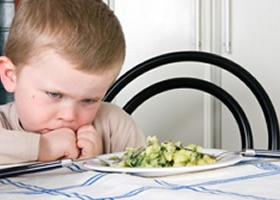Infants and toddlers are picky eaters, and parents are often concerned that their little one isn’t getting enough to eat. But according to a study published in Pediatrics, pressuring children to eat might actually make them eat less.
The studied involved 62 mothers and their children from birth to two years. The study found that one year olds who were pressured to eat ended up weighing less at age two than children who weren’t cajoled into eating.
Turning the dinner table into a battleground starts a vicious cycle. Pressuring a baby to eat only makes the baby fussier and less likely to eat. This in turn makes the parent more anxious about giving the baby more to eat. The best advice is to step back and follow your child’s lead. Make sure you offer a well-balanced diet, and your child will likely get what she needs even if she is sometimes eating only one or two full meals a day. Also, take a look at how much milk, water or juice she is drinking during the day. Drinking too much can fill up children’s stomachs, leaving little room for solids. If you are concerned about your child’s diet or weight gain, contact your physician for advice.
For more information:
